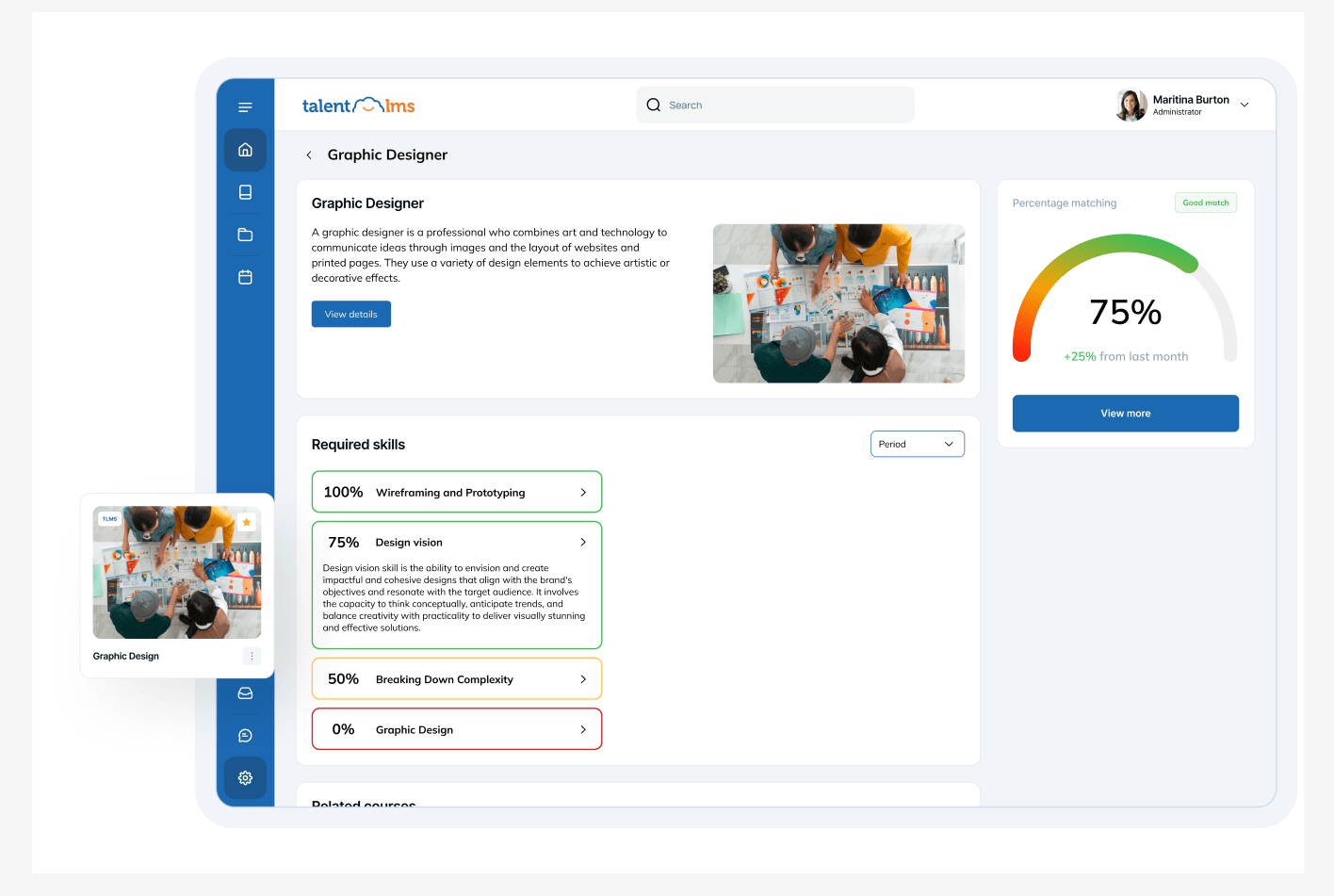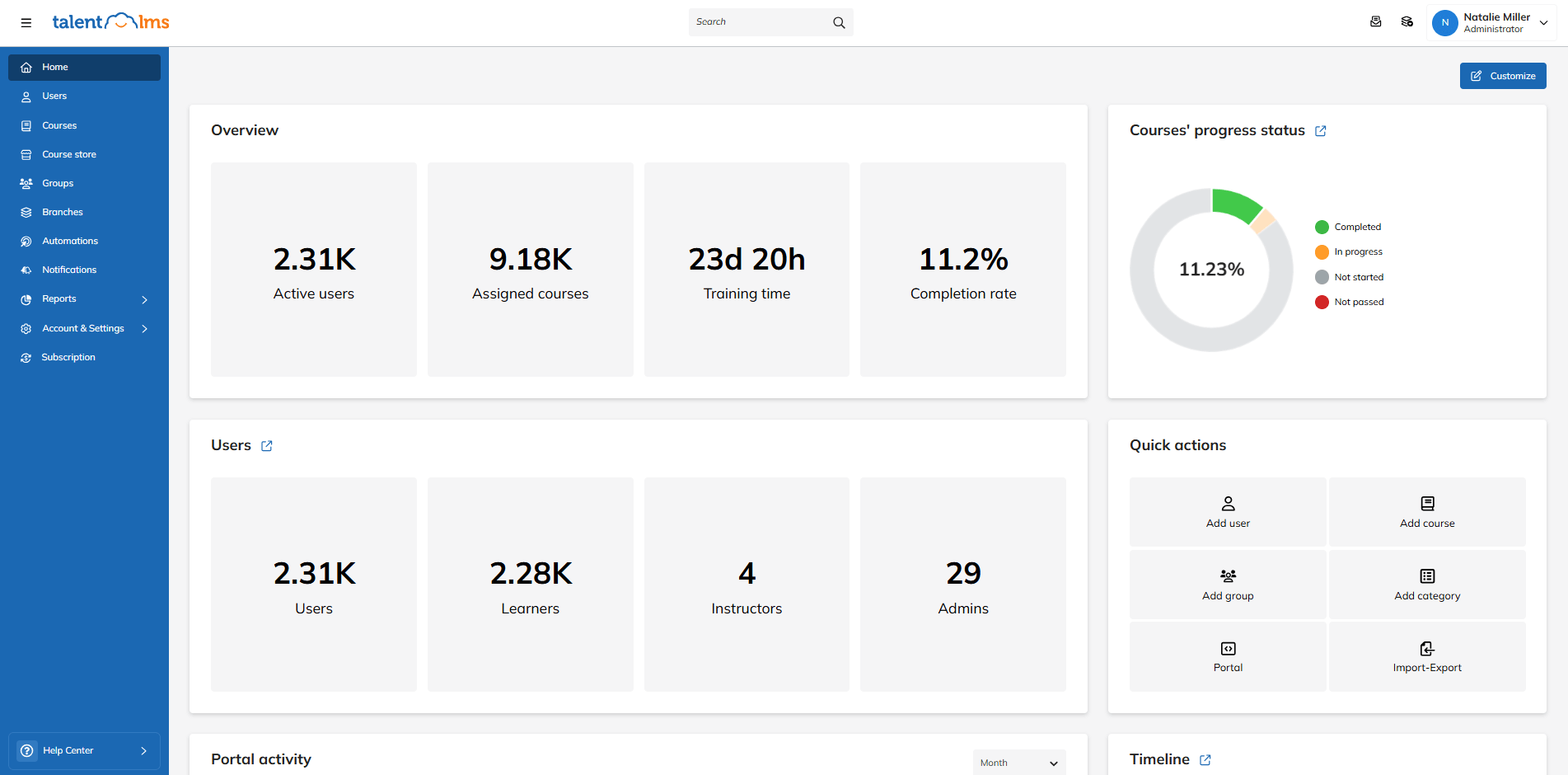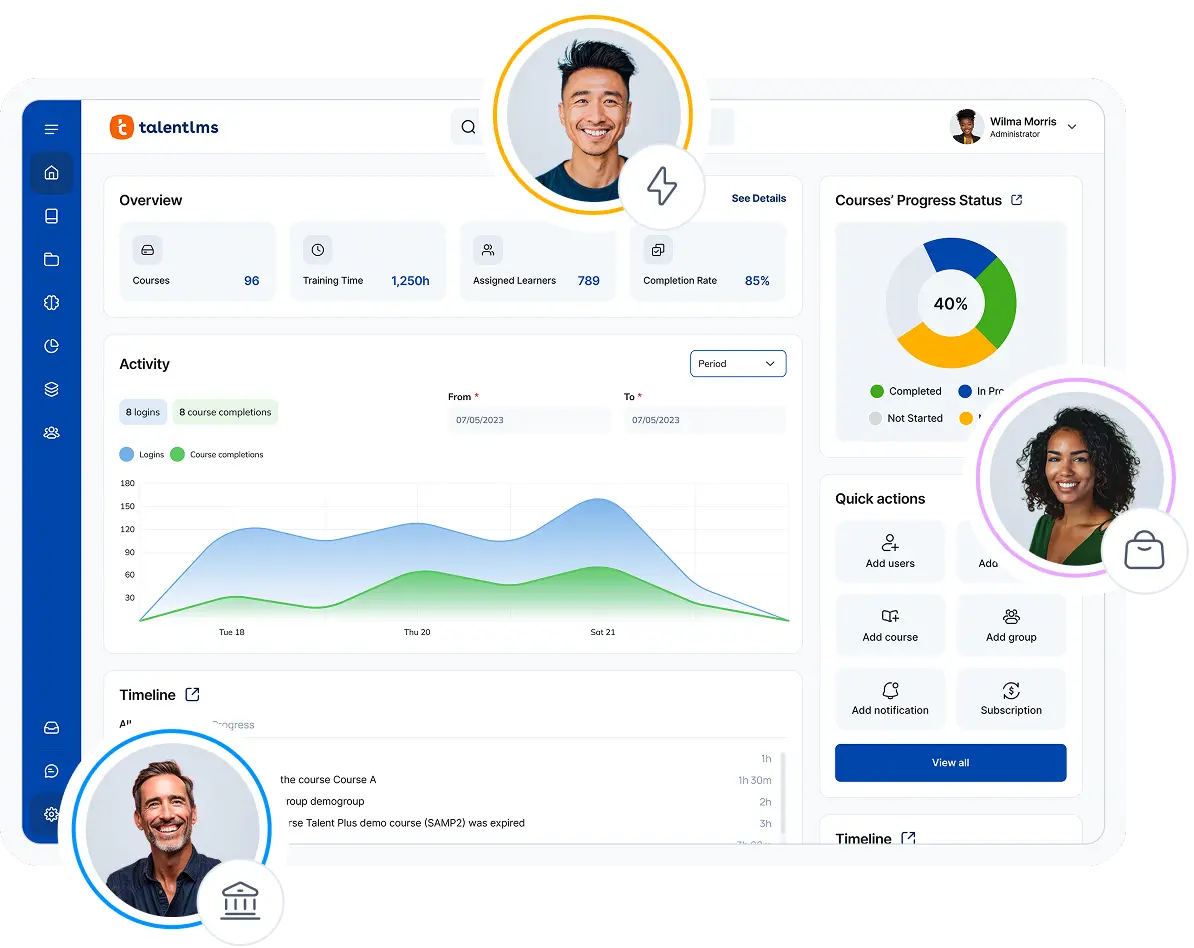Employee training is very important. But applying traditional “one-size-fits-all” methods can feel like a clunky approach to problems that are complex and personal.
On top of that, you’re juggling different learning styles, busy schedules, and the ever-present need to prove ROI on your L&D initiatives.
Meanwhile, the skills gap keeps widening.
Instead of throwing more generic training at these problems, you need a permanent solution, such as a learning management system (LMS).
What is the main purpose of an LMS?
Most articles about learning management systems hit the same tired points: they’re good for online training, they help track progress, and they can centralize learning materials. Yawn.
While those are all true, they barely scratch the surface of what a powerful LMS can do for your organization.
It’s no secret that proactively building employee skills will help navigate the evolving future of work. And with the half-life of these becoming shorter and shorter every year, most leaders are left with a constant uphill “upskilling and reskilling” battle.
Sagar Goel of Boston Consulting Group discusses this very issue in our podcast episode, “The building blocks of successful employee reskilling”.
Through continuous learning and reskilling initiatives, you can leverage the power of a learning management system is to fuel long-term growth, both for your employees and your organization as a whole.
Why is an LMS effective?
A learning management system is effective because it aligns a training program with how we naturally learn and grow.
Instead of relying on outdated methods like heavy manuals and lectures, a learning management system uses engaging formats like videos, assessments, and gamification to boost the learning experience. Also, many AI LMS platforms have been designed to help with things like course creation, skills assessment and management.

It makes employee learning easy by giving employees access to resources whenever and wherever they want. A big advantage in today’s on-the-go work environment.
It moves beyond passive learning by adding quizzes and assessments that reinforce knowledge and improve retention.
And because data drives continuous improvement, a learning management system lets you gain valuable insights into learner progress and patterns. These can help you identify improvement areas, measure your training program’s effectiveness, and optimize your L&D strategy for maximum impact.
The beauty of it is that it helps reinforce a culture of continuous learning, which is critical in this day and age. As Goel puts it: “[…] it’s very important to invest in your learning. And I keep saying this, the most important skill today is learning agility, which is our ability to continuously unlearn, relearn, and learn new things.”
What are the benefits of an LMS?
There are numerous benefits tied to a learning management system. Let’s take a look below.
Benefits of an LMS for employees
LMS training programs are an investment in your workforce that unlocks a lot of benefits for your employees.
Skill development
An LMS is a powerful tool for nurturing talent and driving skill development. Instead of using the carrot and stick method, it empowers employees to take the reins of their own development.
They can dive into a treasure trove of resources and interactive modules that fit into their busy schedules.
With it, your marketing team can master the latest social media trends through a series of engaging online modules, or your developers can become coding ninjas thanks to an LMS-hosted hackathon and coding challenge.
Career advancement
76% of employees are looking for a chance to advance their careers, and 45% of them would stick around longer if the company they worked for invested in their L&D.
With a learning management system, you personalize employee training based on their current skills and future goals, helping them grow in a direction that fits the company and keeping them around longer.
For example, you have a sales rep who wants to step into a management position. With an LMS, they can access leadership training programs and communication skills workshops to boost their learning experience.
The best learning management systems also offer a variety of ready-made training courses that make online learning accessible, and help learners engage at their own pace.

Increases engagement and motivation
Most employees (92%) feel that good training programs boost their engagement at work when they’re set up properly. A well-set-up training program moves beyond one-size-fits-all approaches and addresses each unique need.
Employees who actively invest in their learning process through an LMS are the ones who will thrive. The role of employers is to give them these opportunities and to help them stay motivated. If you don’t, you and your employees lose the upskilling and reskilling game.
Goel states that: “60% of companies are already reskilling their workforce in some way.” That’s right. Your competitors are probably already investing in ongoing employee development because they know how important it actually is.
Goel adds, “Investing in upskilling and reskilling is key to attracting and keeping top talent.” So, if you want to build a dream team that can tackle anything, an LMS is your secret weapon.
Flexibility and accessibility
The beauty of an LMS is that it caters to everyone’s learning style, so whether your team members are visual learners, auditory learners, or hands-on doers, they’ll find something that clicks. And when online learning is engaging and accessible, people actually want to do it.
Another benefit is that your team can access learning materials anytime, anywhere, and on any device. This is especially important for remote or hybrid workforces.
Early birds can squeeze in a module before the day starts, night owls can learn after the kids are in bed, and everyone in between can fit learning into those spare moments throughout the day.
Staying competitive in a challenging job market
In today’s job market, if you’re not learning, you’re falling behind. With AI taking things to the next level, this has never been more true than ever.
Looking to the future, as Goel puts it, we see “[…] the death of the degree.” We’re moving away from traditional learning “[…] into more micro-credentials or shorter modules or courses which are stackable to earn you always on degree or a degree that you get over a lifetime.”
He even estimates that by the time you receive your formal qualifications, “[…] maybe 20, 30% of your skills are redundant and frankly, that’s the challenge […] we all need to embrace.”
So, it’s safe to say that employees are going to be looking for continuous learning opportunities that provide them the skills they need to flourish in their current or future roles.

Benefits of an LMS for organizations
Investing in an LMS has many organizational benefits that ultimately drive your business to newer levels of success.
Improved employee performance
A bold 59% of employees believe that more training improves their performance. But the learning experience (once again) has to be good, and not 30-year-old training courses that don’t help them learn skills they can apply.
An LMS has everything you need to make your own online courses while keeping them entertaining and focused.
Say you run a retail company, and you are now using an LMS to train its sales associates on product knowledge, customer service skills, and upselling techniques.
With this knowledge at their fingertips, the associates are better equipped to assist customers and boost customer satisfaction.
Reduced training costs
Not only are traditional training methods ineffective, they are expensive. Consider the costs of travel, accommodation, and printed materials. Worse than that, ineffective training is just more money down the drain.
An LMS eliminates the need for in-person sessions with online training. No more booking expensive conference rooms, flying in trainers, or printing mountains of handouts. Plus, with an LMS, you can easily update and repurpose your training content, saving you time and money in the long run.
For example, envision a global company using an LMS to onboard new hires worldwide. Instead of flying everyone to a central location, they can create a consistent and engaging onboarding experience online, saving significant travel and accommodation costs.
Increased employee engagement
Did you know that 90% of people prefer learning online to traditional learning methods? As we already mentioned, when you cater to how people want to learn, then they naturally want to learn more and engage better with the content.
Plus, an LMS injects new life into the learning process with interactive elements, gamification, and social learning opportunities.
For example, a marketing agency could use learning management systems to create a “campaign challenge,” where teams compete to develop the most creative and effective marketing strategy. Or, a customer service team could use the platform to share best practices and learn from each other’s experiences in a dedicated online community.
Scalability
An LMS is the cornerstone of a company’s growth.
It can effortlessly deliver consistent training materials to employees across different departments, locations, and even time zones. Removing any logistical headaches or scrambling to accommodate a growing team.
Envision a tech startup that’s experiencing rapid growth. With learning management systems, they can easily onboard new employees, supply access to role-specific training materials, and track their progress—all in one centralized platform.
In this sense, the LMS also becomes a key player in any HR team’s tech stack.

Long-term sustainable business growth
As we said earlier, the half-life of skills these days is shorter than ever. What your employees learned last year might already be obsolete. We need to treat training like an ongoing process to keep up and keep growing.
In the TalentLMS podcast, Sagar Goel puts it perfectly: “Companies need to move from a mindset of ‘train and forget’ to ‘continuous learning’.”
Learning management systems make this continuous learning process possible by providing the infrastructure for ongoing development and skill-building.
The value of an LMS
So, what’s the real value of learning management systems?
Simply put, an LMS is an investment in your people, your organization, and its future. It’s a catalyst for growth, a hub for learning, and emphasizes the importance of training employees to align with your business goals.
It’s the key to unlocking the full potential of your employees, driving innovation, and staying ahead of the growing skills gap.
If you’re ready to take your organization to the next level, it’s time to embrace the power of an LMS.
Sign up free to TalentLMS and explore one of the best learning management systems on the market.
Get started on your journey to continuous learning with a tool that delivers all the LMS benefits and more.
| Tags: AI LMS





